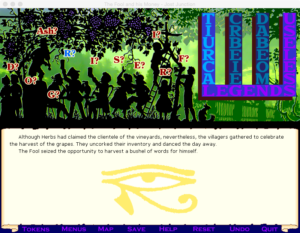Bundle for Racial Justice and Equality: My Picks
Probably anyone reading this blog knows, but: Itch.io has a truly monumental bundle going right now, called the Bundle for Racial Justice and Equality, consisting of “1,659 items” (as of this writing; the number keeps going up 1The final count is 1704. ), mostly games, many of them good, for a minimum price of $5, all proceeds going to the NAACP Legal Defense and Educational Fund and Community Bail Fund. It’s running for just two more days. A more ambitious games blogger than myself could spend the rest of their life blogging just about this bundle.
Since such a massive collection is in obvious need of curation, people have been posting lists of their picks on social media. I figure I might as well do the same here. I’m not saying these are the only games in the bundle worth playing, just that they’re the ones that I personally have played and would recommend to others.
- Interactive Fiction and other largely text-based stuff
- Voyageur: There are quite a few choice-based space-exploration games out there, but this is probably the most polished. Sort of a cross between 80 Days and FTL.
- What Isn’t Saved (will be lost): A sci-fi meditation on memory and difficult choices. Almost unbearably tense.
- Wheels of Aurelia: I’ve mentioned this one in passing before. It’s an interesting experiment in interactive dialogue: you’re talking while you’re driving, so your attention is split and the conversation is affected by what turns you make and how fast you go. Set in 1970s Italy, with a story very concerned with the politics of that time and place.
- Dominique Pamplemousse in “It’s All Over Once the Fat Lady Sings”: Claymation adventure game detective musical with interactive sung dialogue that actually manages to fit the beat of the background music.
- Extreme Meatpunks Forever: A lo-fi Visual Novel about gay fugitives in a messed-up world, peppered with mech-fighting action sequences where you try to shove fascists off cliffs. I don’t usually have a lot of patience for VNs, but Meatpunks has a unique energy.
- The Quiet Sleep: Hard to describe. It’s an abstract system for telling stories by means of resource acquisition on a hex grid.
- 2D Platformers
- Celeste: Previously. Extremely polished, the pinnacle of Matt Thorson’s 2D platformer career. Tough as nails, but paradoxically kind-hearted.
- And Yet It Moves: Previously. Puzzle-platformer in a rotatable environment with a torn-paper aesthetic.
- Pikuniku: I’m only a little ways into this, but it’s a metroidvania with a very strong aesthetic. Characters are simplified in a way that complements their comically blunt demeanors.
- BasketBelle: Previously. Intriguingly combines shooting hoops with platformer mechanics.
- Four-Sided Fantasy: Another high-concept puzzle-platformer, based on giving the player control of whether the screen has wraparound or not at any given moment. It’s a device that turns out out to have more legs than it sounds.
- Other Explorey Environments
- Oxenfree: I’m not wild about horror movie tropes, but the interaction and dialogue system is definitely worth a look.
- A Short Hike: A charming and relaxing mountain climb in a recreational area with anthropomorphic animals. Kind of like a one-sitting single-player Animal Crossing.
- Minit: A high-concept action-adventure, exploring what uses a game can make of short time constraints. Very well-done formal experiment.
- Anodyne: A light, fanciful action-adventure, similar to an early Zelda game in both mechanics and graphical style, but more wry and deliberately surreal.
- The Aquatic Adventure of the Last Human: Previously. Melancholy 2D underwater metroidvania. Just you and a submarine against immense monsters amidst the ruins of human civilization.
- Dr. Langeskov, The Tiger, And The Terribly Cursed Emerald: A Whirlwind Heist: Fourth-wall-demolishing first-person nonsense from one of the Stanley Parable people.
- Other Puzzle Games
- Mu Cartographer: Previously. Recommended for anyone who likes fiddling with unlabeled controls to figure out what they do.
- GNOG: A collection of pure jiggery-pokery puzzles themed around grotesque headboxes.
- Adjacency: One of those abstract puzzle games with soothing ambient music. Simple mechanics, but gets very tricky (in ways other than increasing the number of parts).
- Puzzle Puppers: Basically, numberlink with elongated corgis. Has some complications beyond that, like teleporting tunnels, but that’s the essence of it.
- Not cleanly categorizable as any of the above
- Art Sqool: More satisfying as an aesthetic than a game, but worth a look just for that.
- Nuclear Throne: One of the best action-roguelikes out there.
- Glittermitten Grove: A delightful fairy management sim. I hear it has some secrets. Maybe you’ll have better luck finding them than me.
- Windosill: Previously. Short, dark, surreal twitch-and-wiggle game from Vectorpark.
- Metamorphabet: Another Vectorpark game. I don’t like it as much as Windosill — it’s pitched more at the kiddies, so it stops short of giving them nightmares. Still worthy, though.
- Quadrilateral Cowboy: A satisfying hackery game, and one of the few cyberpunk games to take the “punk” part to heart.
- Old Man’s Journey: A peaceful and aesthetically pleasing travel story where the main mechanic is raising and lowering the level of the ground.
- The Hex: Six videogame characters from different genres meet at an inn to witness a murder. I didn’t think much of this at first — it seemed indulgent, and the mini-games built around each character not well-developed. But it won me over with its increasing complexity, deepening story, and pervasively sinister atmosphere.
| ↑1 | The final count is 1704. |
|---|
 Comments(0)
Comments(0)